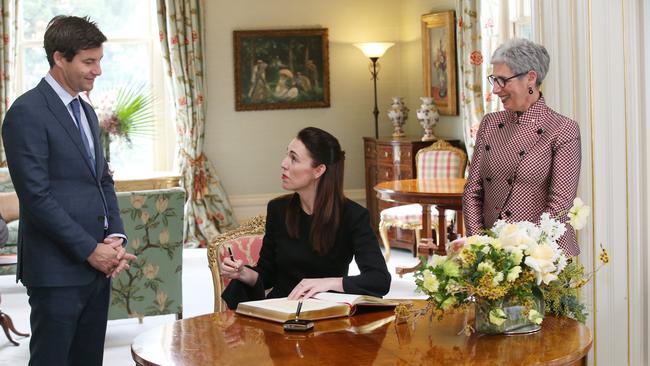Jacinda Ardern delivers bleak view of global affairs
Jacinda Ardern has blamed distrust in government for the rise of nationalist movements.

New Zealand Prime Minister Jacinda Ardern has blamed disaffection and distrust in government and growing wealth inequality for the rise of nationalist and authoritarian movements that threaten the rule of law, freedom of expression and other fundamentals of Western democracies.
Speaking in Melbourne ahead of today’s meeting with Scott Morrison, Ms Ardern delivered a sobering and at times bleak assessment of global affairs, warning that an era of “shock politics” and fake news had breathed life into ideologies once thought to have been consigned to history.
“Around the world, democratic values and institutions are under threat in a way that many of us never expected to see in our lifetimes,’’ she told an Australian and New Zealand School of Government event at Melbourne’s Town Hall.
“Nationalist sentiment that closes off the possibility of countries working together is surging. Authoritarian movements and regimes are on the rise.
“Norms that we in New Zealand take for granted — the rule of law, the peaceful transfer of power, freedom of expression — are being challenged in new and more explicit ways.
“These trends are possible only because large … numbers of people believe, rightly or wrongly, that their leaders are failing them.”
Ms Ardern, a Labour Party leader who rose to power in an unlikely coalition with the nationalist New Zealand First party of Winston Peters, will raise with the Prime Minister the “corrosive” issue of Australia’s crackdown against New Zealand expat criminals, which last year led to the deportation of about 800 Kiwis back across the ditch.
Ms Ardern told New Zealand reporters in Melbourne it was legitimate for Australia to deport New Zealand nationals who had committed serious crimes but cases involving people with tenuous links to the country had become a thorn in the side of bilateral relations. “I consider that to be a corrosive part of that policy and it is having a corrosive effect on our relationship,’’ she said.
Ms Ardern said she did not plan to raise one of the other sore points in Australia-New Zealand relations — the standing offer by Wellington to accept asylum-seekers from Nauru and Manus Island.
Ms Ardern is on a two-day visit to Melbourne. Between meetings with Victorian Premier Daniel Andrews and Mr Morrison, she has spent much of her time talking to Australian banks and institutional investors about her government’s latest moves to tighten foreign investment rules.
The principal purpose of her visit was to deliver her ANZSOG speech, an event scheduled in March but postponed because of the Christchurch terror attack.
While Ms Ardern did not cite examples of emerging authoritarian regimes, her comments coincide with the rise of the far-right Freedom Party of Austria, the steady accumulation of power by Hungary’s Viktor Orban, Turkey’s Recep Erdogan and Russia’s Vladimir Putin, and the anti-elitist nationalism that fuelled the vote for Brexit and Donald Trump.
Ms Ardern outlined to a predominantly Australian audience the redistributive agenda at the heart of her government’s “wellbeing budget” delivered seven weeks ago.
In comments that put her government at odds with the reform legacy of the Lange government, Ms Ardern said the deregulation of New Zealand ’s economy and transformation of the tax and welfare systems 30 years ago had led to inequality and child poverty.
“In many countries, while the very wealthiest have grown consistently wealthier, the rest have seen little or no real rise in their income or their living standards over decades.
“That is certainly the case in New Zealand.’’
Ms Ardern said opening New Zealand to the world had the perverse effect of making her country feel more distant.
“Stunningly, our most connected generation in New Zealand has also been found to be our loneliest,” she said.
In this year’s budget, New Zealand broadened its traditional economic goals to include social objectives such as reducing family violence and child poverty, and improving mental health.



To join the conversation, please log in. Don't have an account? Register
Join the conversation, you are commenting as Logout